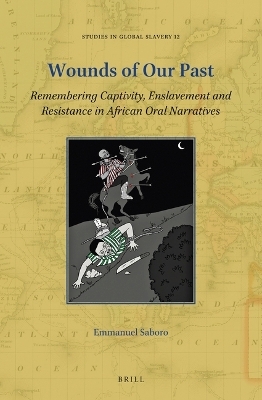
Wounds of Our Past
Brill (Verlag)
978-90-04-50017-4 (ISBN)
Emmanuel Saboro (PhD) is a Senior Lecturer at the Centre for African and International Studies, University of Cape Coast, Ghana. He obtained his PhD at the Wilberforce Institute for the Study of Slavery and Emancipation (WISE), University of Hull, England. He is a fellow of the American Council of Learned Societies (ACLS), African Humanities Program. His most recent publication Slavery, Oral Tradition and Identity Construction has appeared in T. Falola & T. Akinyemi (Eds), Palgrave Handbook of Oral Traditions and Folklore (Palgrave Macmillan, 2021).
Contents
Foreword
Acknowledgements
List of Illustrations
Note on Transcriptions and Translations
Introduction: Envisioning the Past in the Present: Hearing the Unsaid
1 Northern Ghana and the Historiography of the Slave Trade
2 Reconfiguring Enslavement and the Slave Trade in Africa: the Place of Oral Tradition
3 Memory/Remembering
4 Sources and Methods
5 Structure of the Book
1 Remembering a Fractured Past: Historicizing Violence, Captivity, and Enslavement in Northern Ghana in the Nineteenth Century
1 Introduction
2 The Gold Coast and the Trans-Atlantic Connection
3 Navigating Histories, Constructing Identities: Geography and People of Northern Ghana, the Bulsa and Kasena in Perspective
4 Post-abolition Slavery and the Slave Trade in the Nineteenth Century
5 Asante and the Slave Trade in Northern Ghana in the Nineteenth Century
6 The Zabarima Slave Raiding Hegemony in Northern Ghana
7 “Babatu Has Really Dealt with Me and I Know”: the Portrait of a Ruthless Leader
8 ‘Places, Places Are Still There’: Salaga, a Bloodied Landscape of Captivity, Enslavement, and Dispossession
9 Conclusion
2 The Song as a Cultural and Historical Archive for Reconstructing the Past
1 Introduction
2 The African Song Tradition: a Brief Overview
3 Song Traditions in Northern Ghana: the Bulsa and Kasena in Perspective
4 “They Have Killed Me, Killing of a Different Kind”: Dirges/Laments/Sorrow Songs
5 War and Victory Songs
6 The Bulsa Battle Cry
7 The War Flute
8 Performing Pain: Song, Ritual Dance, and Performance
9 “Singing Rocks”: The Pikworo Slave Camp Songs
10 Conclusion
3 ‘Unspeakable Things Spoken’: Cultural Constructions of Trauma, Mourning Loss
1 Introduction
2 Framing Violence: Metaphorizing the Kanbong (Foreign Enslaver) as the Other
3 Sexual Violence
4 Of Mothering and Motherhood
5 Of Place, Belonging and Home
6 Where There Are No Graves: Metaphorizing Death and Mourning Loss
4 “Sins of Our Fathers”: Re-reading Indigenous Complicity Narratives
1 Notions of Betrayal: the Insider Motif
2 The Politics of Silence: Survival or Complicity?
3 Conclusion
5 “We Are Free at Last”: Local Adaptations and Indigenous Resistance Strategies against Captivity and Enslavement in the Hinterland
1 Introduction
2 “We Have Fled, Fled a Lot”: Flight as a Survival and Resistance Strategy
3 The Landscape and Hollow Trees as “Refuge Sites”
4 Hiding in Hollow Trees
5 Drums of War: Contestations and Deconstructing Notions of Victimhood
6 Animistic Metaphors as Counter Representation Strategies
7 The Lion
8 The Elephant
9 Celebrating Triumph over Tragedy
10 Conclusion
Conclusion: Freedom beyond the Wound and the Silences
Glossary
Bibliography
Index
| Erscheinungsdatum | 19.04.2022 |
|---|---|
| Reihe/Serie | Studies in Global Slavery ; 12 |
| Verlagsort | Leiden |
| Sprache | englisch |
| Maße | 155 x 235 mm |
| Gewicht | 465 g |
| Themenwelt | Kunst / Musik / Theater ► Musik ► Musiktheorie / Musiklehre |
| Geisteswissenschaften ► Geschichte | |
| ISBN-10 | 90-04-50017-0 / 9004500170 |
| ISBN-13 | 978-90-04-50017-4 / 9789004500174 |
| Zustand | Neuware |
| Informationen gemäß Produktsicherheitsverordnung (GPSR) | |
| Haben Sie eine Frage zum Produkt? |
aus dem Bereich


